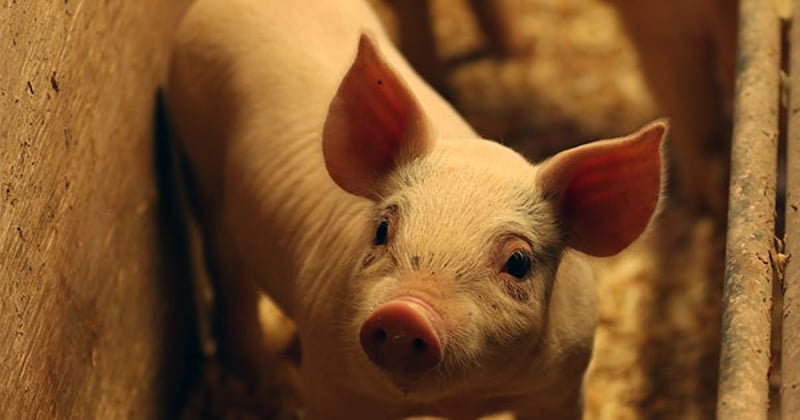
Climate Change & Cruelty - Revealing the impact of factory farming
News
Factory farming, the silent culprit of climate change
When most people think of climate change, they think of fossil fuels being extracted and burnt for our energy and transport needs. Our new report, reveals the true impact of factory farming on our planet, finding that ongoing expansion of factory farming will put the achievement of the Paris Climate Agreement goals and a climate-safe future out of reach.
The impact of factory farming on climate
We recently conducted a study that has revealed the true impact of factory farming on our planet, finding that ongoing expansion of factory farming will put the achievement of the Paris Climate Agreement goals and a climate-safe future out of reach
Every year, 80 billion animals are farmed globally, most on cruel factory farms. This latest report, Climate change and cruelty: revealing the true impact of factory farming, analysed the environmental impact of factory-farmed chicken and pork in four of the world’s biggest factory farming hot spots. It found that emissions from chicken meat in Brazil, China, Netherlands and US alone are equivalent to keeping 29 million cars on the road for a year.
Pork and chicken are often overlooked as contributors to climate change, as more emphasis is placed on the methane that cows produce from digestion and manure. This report exposes the hidden climate impact of factory farming, showing that we need to shift diets away from pork and chicken as well as beef to plant based diets if we are to combat climate change from our food system.
Four of the biggest factory farming hot spots were assessed – Europe (using data from the Netherlands), US, Brazil and China. Top-line findings show that:
- Land is cleared in biodiversity hot spots to grow crops to feed farmed animals, releasing carbon into the atmosphere and destroying wild animal habitats. Crops are traded globally, destined for factory farms
- When deforestation to grow feed crops – especially soya - for global trade is considered, this doubles the overall climate change impact of factory farmed meat in the Netherlands and increases the impact by more than one and a half times in China
- A 50% reduction in consumption of both chicken and pork by 2040, along with a 50% adoption of higher welfare products would halve the annual climate impacts of chicken and pork production across these four hot spots
- This would be equivalent to taking 45 million cars off the road for a year in the four hot spots combined.
The study is the first to measure how eating less factory farmed chicken and pork could help safeguard our climate if combined with ending the cruellest practices on factory farms.
It comes as factory farming is expected to explode, as demand for meat is expected to increase as much as 30% in Africa, 18% in Asia Pacific, 12% in Latin America, and 9% in North America by 2030.
How can we reverse the situation?
In addition to analysing the climate impact of pork and chicken production in the world's biggest factory farming hot spots, the study is the first to measure how eating less factory farmed chicken and pork could safeguard our climate, if combined with ending the cruellest practices on factory farms.
It shows that a 50% reduction in consumption of both chicken and pork by 2040, along with a 50% adoption of higher welfare products would halve the annual climate impacts of chicken and pork production across the four factory farming hot spots.
This would be equivalent to taking up to 45 million cars off the road for a year in the four-factory farming hot spots combined.
It’s time for a change
The factory farming industry, governments and consumers can play a key role in transforming the food system and reaching a kinder and sustainable future.
World Animal Protection is calling for the industry to transition to a humane and sustainable food system by implementing FARMS farm animal welfare standards as a minimum, halving production of animal protein by 2040, and phasing out sourcing of monocrops like soya as feed for farmed animals.
Governments must stop approving new factory farms now by imposing a moratorium for a 10-year period. Governments are the key player in subsidising factory farming. They have the power to shift policy and funding decisions away from factory farming in support of humane and sustainable food systems.
Consumers can choose to eat less meat. By consuming fewer animal products and choosing higher welfare products (eat less and better), we can help to safeguard our climate and planet, and protect animal welfare.
What can I do?
The factory farming system is unspeakably cruel, unsustainable and contributing to our climate crisis. World Animal Protection is working for a humane and sustainable food system where factory farming is a thing of the past. Where there are fewer farmed animals, and they are afforded dignified lives in sustainable systems. Where diets around the world are mostly plant-based, taking the pressure off our planet and giving wild animals a home once more.
We know that it is not enough only to take animals out of cages and end the worst forms of cruelty on factory farms. A moratorium on new factory farms is an immediate next step. Remaining factory farms need to raise animal welfare standards and relieve animal suffering
